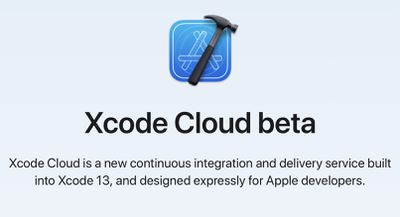Apple today began notifying developers that they're able to use the new Xcode Cloud service that was first introduced at the Worldwide Developers Conference in June.

"We're pleased to let you know your account has been enabled for Xcode Cloud beta," reads the email sent out to developers. "You can now take advantage of continuous integration and delivery service built into Xcode 13."
Xcode Cloud, let’s goooo pic.twitter.com/Fj9l8R1bsj — Steve Streza 🏳️🌈 (@SteveStreza) June 28, 2021
Xcode Cloud is a cloud-based Xcode service that allows developers to build, test, and deliver high-quality apps in the cloud rather than directly on a Mac.
Xcode Cloud is a new continuous integration and delivery cloud service designed specifically for Apple developers. Built into Xcode 13, Xcode Cloud offers a fast and simple way for developers and teams of all sizes to build, test, and deliver high-quality apps even more efficiently. Xcode Cloud can automatically build apps in the cloud to free up developers' Macs for other tasks. Parallel testing in the cloud means developers can test on a simulated version of every current Apple device, then easily deploy a build of the app for internal testing, or deliver to external beta testers through TestFlight for instant feedback.
Apple has been allowing developers to sign up for the Xcode Cloud waitlist prior to now, and there are multiple reports on Twitter from developers who have been granted beta access. All developers who are Account Holders in the Apple Developer Program as of June 7, 2021 are eligible to sign up for Xcode Cloud, though a Mac with the latest beta version of Xcode 13 is required.





















